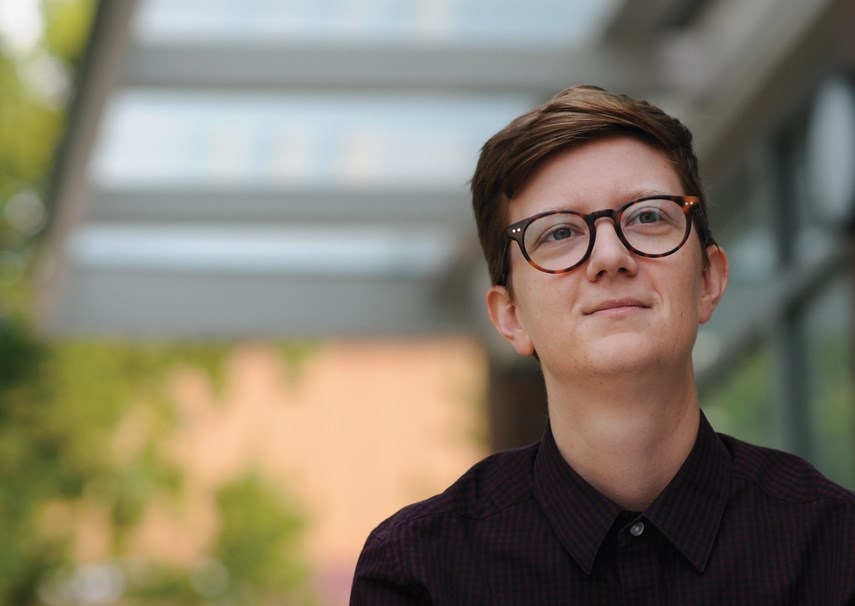The banner stretching across her locker was defaced by a single word.
It was school tradition to celebrate students’ birthdays by festooning their lockers with a poster.
But on Grace McDonell’s birthday a magic marker-wielding troll marred that tradition by scrawling the word Dyke on her banner.
“I never told anyone,” she recalls.
She tried to erase it from her memory but found one thought wouldn’t go away.
“I don’t want this to happen to another person,” she recalls thinking. “So what can I do?”
Going into the legal profession seemed an obvious choice. After all, McDonell grew up listening to her lawyer father debate her lawyer uncle at family dinners, all while awaiting the verdict of her chief justice great uncle Allan McEachern.
She was in awe of McEachern’s accomplishments, she says, noting his tenure as CFL commissioner and his push to post legal judgments online.
“He made the legal profession more accessible to the public,” she says.
But given the preponderance of reasons to enter the legal profession, the Handsworth Secondary grad looked for a reason to do something else.
She would be a chef or a police officer or an academic. But throughout her endeavours, the law was the bungee cord that snapped her back.
“I feel more comfortable in the courthouse than I do in most places,” she says.
She also wanted a career where she could excel.
“I have overachieved in order to potentially protect myself from being gay ... so that people wouldn’t be able to get rid of me if they found out.”
She’d be following the course charted by her relatives, but she’d see things with a “different lens,” she says.
“I feel a duty not only to the public but also to the LGBTQ community and female lawyers,” she says.
Her first chance to practise law on behalf of the LGBTQ community came while she was still a Thompson Rivers University law student.
Trinity Western University’s bid to open an accredited law school had just received a boost after the B.C. Court of Appeal found in favour of the university.
The case hinged on TWU’s then-mandatory community covenant forbidding sex outside heterosexual marriage. Representatives from TWU noted that no student had been expelled because of sexual misconduct. The argument swayed the court, who ruled that the university community was a minority in need of protection.
“This case demonstrates that a well-intentioned majority acting in the name of tolerance and liberalism, can, if unchecked, impose its views on the minority in a manner that is in itself intolerant,” the court concluded.
For McDonell, the prospect of TWU opening a law school raised the possibility she would be sharing the legal profession with lawyers and judges who have signed a contract, “basically saying that my expression of love is vile.”
As part of a coalition of LGBTQ law students and allies dubbed the OutLaws, McDonell was granted intervenor status in the case.
In a 7-2 decision, the Supreme Court of Canada overturned the previous decision, calling the requirement to restrict your sexual identity according to someone else’s religious beliefs: “degrading and disrespectful.”
Since the ruling, TWU has maintained the covenant for staff and faculty but made the code voluntary for students.
While she characterized the change as a “business decision,” McDonell said she was still generally happy with the result.
“I don’t think they would have made it voluntary if we didn’t go to the Supreme Court of Canada,” she says, suggesting the decision to maintain the covenant for faculty, left her some work to do.
But McDonell also recognized the need for change at Thompson Rivers University.
“When I got to TRU, I was the only out person at the school,” she says. “I was like: ‘statistically, this is impossible.’”
She wanted to leave the school a more welcoming place than the one she’d found, she recalls.
“If there had been other out students at the school I probably would have felt extraordinarily encouraged ... but I didn’t really have that so I wanted to build that for classes after me.”
To mark her work in that regard, TRU is slated to award the first Grace McDonell scholarship in February 2019 for high achieving students who help foster diversity.
That means LGBTQ students but it also means allies, McDonell emphasizes.
“I recognize that I would not be at this point or I would have never been able to get to Ottawa without allies,” she says, noting the many people who offered emotional and financial support.
These days, the voice of the TRU OutLaws is Vanessa Singleton, who has been quoted on topics ranging from TWU’s covenant to author and media star Jordan Peterson.
It’s a good feeling to see the club have a voice in major debates, McDonell says.
“The work that I’ve done has created a voice and created a platform for a school club.”
She also recorded a tiny impact on Prime Minister Justin Trudeau, she notes.
She met Trudeau shortly after the prime minister issued his apology for Canada’s history of discrimination against the lesbian, gay, bisexual, transgender and queer community. She thanked him, hugged him, and gave him Pride Socks, she says.
From a distance, she saw Trudeau again at the Pride Parade – and she noted his footwear.
“I’m pretty sure those are the socks,” she says.
McDonell isn’t certain where her legal career will take her, although she can’t wait to find out.
“It’s kind of frustrating to not actually be a real lawyer yet,” she says.
However, she knows the code she wants to live by.
“Find something that you care about and something that you want to say, and just be a nuisance about it.”



